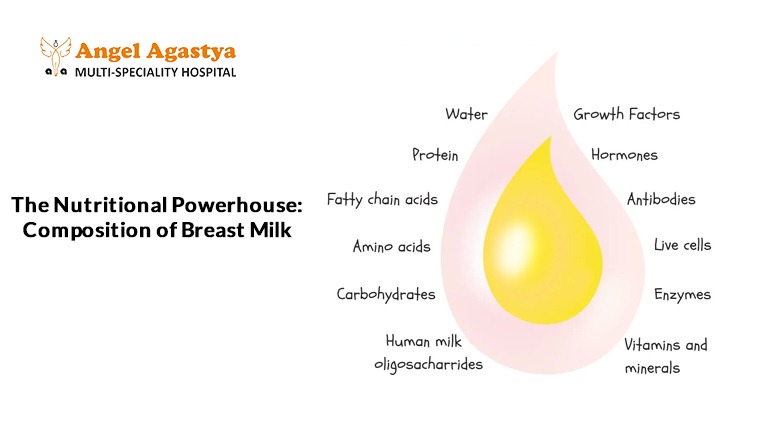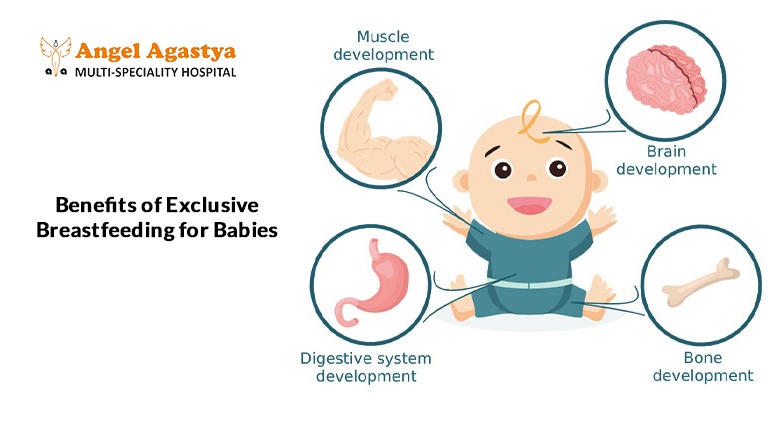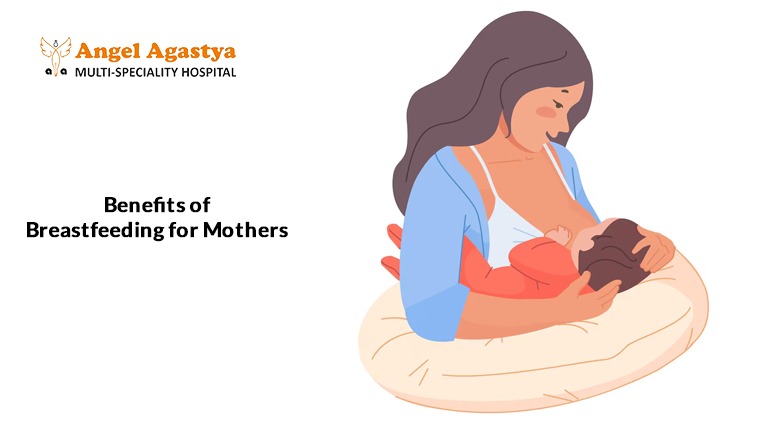Feed Your Baby with Mother’s Milk Till 6 Months: A Comprehensive Guide
Every drop of breast milk is more than just food—it’s love, protection, and connection.
As a mother, your body holds the wisdom to nourish, heal, and nurture your baby in the most natural way possible. Exclusive Breastfeeding is not only a gift of nutrition—it’s a bond that shapes your baby’s health, happiness, and future. If you’ve ever doubted your ability or wondered why it matters so much, this blog will gently remind you: you were made for this.

Introduction
Breast milk is the best food for your baby. It contains all the nutrients needed for growth and protects against diseases. The World Health Organization (WHO) recommends exclusive breastfeeding for the first six months. This means feeding only breast milk, with no other liquids or solids.
Breast milk is the best food for your baby. It contains all the nutrients needed for growth and protects against diseases. The World Health Organization (WHO) recommends exclusive breastfeeding for the first six months. This means feeding only breast milk, with no other liquids or solids.
Why Breastfeeding is Important
Breast milk is packed with proteins, fats, vitamins, and antibodies that help babies grow strong and healthy. It changes as your baby grows to meet their needs.

Benefits for Your Baby
- Strengthens the immune system
- Lowers the risk of infections and allergies
- Supports brain development and healthy weight
- Reduces the risk of Sudden Infant Death Syndrome (SIDS)
Benefits for Mothers
- Helps in postpartum recovery
- Burns extra calories and aids weight loss
- Lowers the risk of breast and ovarian cancer
- Strengthens the bond between mother and baby
Breastfeeding is a natural and healthy start for your baby! Let’s explore why exclusive breastfeeding for the first six months is the best gift a mother can give her baby.
The Nutritional Powerhouse: Composition of Breast Milk

Exclusive Breastfeeding is the gold standard for infant nutrition. Breast milk is a dynamic and complex substance uniquely designed to meet a baby’s changing nutritional needs. It contains essential nutrients, immune-boosting components, and growth factors that ensure optimal development.
1. Macronutrients: The Building Blocks of Growth
Carbohydrates:
- The main carbohydrate in breast milk is lactose, which provides energy for brain development.
- It supports a healthy gut by promoting the growth of beneficial bacteria and preventing harmful infections.
Proteins:
- Breast milk contains two main types of proteins: whey (fast-digesting) and casein (slow-digesting).
- These proteins are easily absorbed, promoting muscle growth, tissue repair, and a strong immune system.
- Unlike formula, breast milk contains lactoferrin, which helps fight infections and improves iron absorption.
Fats:
- Essential for brain and nerve development, breast milk fats provide nearly half of a baby’s energy needs.
- It contains omega-3 fatty acids (DHA and ARA), which are crucial for vision, cognitive function, and neurological development.
- Fats also aid in the absorption of fat-soluble vitamins (A, D, E, and K).
2. Micronutrients: Supporting Overall Health
Vitamins and Minerals:
- Exclusive Breastfeeding provides a perfect balance of vitamins A, C, D, E, K, and B-complex, supporting skin, vision, and neurological health.
- Iron, calcium, and zinc play key roles in bone development, red blood cell production, and immune function.
- While breast milk naturally contains vitamin D, supplementation may be needed if the mother has low vitamin D levels.
3. Bioactive Components: Immunity and Protection
Antibodies:
- Exclusive Breastfeeding is packed with immunoglobulins (especially IgA), which coat the baby’s gut and prevent infections.
- It protects against common illnesses like colds, diarrhea, and pneumonia.
Hormones:
- Breast milk contains leptin and ghrelin, which regulate appetite and metabolism, helping babies develop healthy eating patterns.
Enzymes:
- Help with digestion and nutrient absorption, making it easier for babies to process milk.
Probiotics and Prebiotics:
- Promote a healthy gut microbiome by encouraging the growth of good bacteria, reducing the risk of digestive issues and infections.
4. Dynamic Composition: Changing to Meet Baby’s Needs
Exclusive Breastfeeding adapts over time to match a baby’s growth and nutritional demands.
Colostrum (First Milk):
- Thick, yellowish milk produced in the first few days after birth, packed with antibodies, white blood cells, and high protein levels.
- Acts as a natural vaccine, providing immunity against infections.
Transitional Milk:
- Starts a few days after birth, with increased fat, lactose, and water-soluble vitamins.
- Supports weight gain and development.
Mature Milk:
- Fully developed breast milk, produced by the second or third week, with the ideal balance of water, nutrients, and immune-boosting factors.
- Continues to evolve based on the baby’s needs, even adjusting during a single feeding session.
Benefits of Exclusive Breastfeeding for Babies

Exclusive Breastfeeding is one of the most powerful ways to give your baby a healthy start in life. It offers complete nourishment, strengthens immunity, and supports long-term well-being.
- Provides Optimal Nutrition
Breast milk contains the ideal blend of nutrients, ensuring proper growth and development. - Boosts Immunity and Protects Against Infections
Exclusive Breastfeeding strengthens the immune system, reducing the chances of common childhood illnesses. - Lowers the Risk of Allergies and Asthma
Breastfed babies are less likely to develop food allergies, eczema, or asthma due to a healthier gut microbiome. - Supports Healthy Growth and Prevents Obesity
Exclusive Breastfeeding promotes metabolism-regulating hormones like leptin and ghrelin, helping maintain a balanced weight. - Reduces the Risk of SIDS
Studies show that Exclusive Breastfeeding lowers the risk of sudden infant death syndrome (SIDS). - Enhances Brain Development
Rich in DHA and ARA, Exclusive Breastfeeding supports brain growth, cognitive skills, and higher IQ levels. - Provides Long-Term Health Benefits
It reduces the risk of chronic conditions like type 2 diabetes, childhood leukemia, and heart disease later in life.
Breastfeeding is one of the most powerful ways to give your baby a healthy start in life. It goes beyond just providing food—it offers complete nourishment, strengthens immunity, and supports long-term well-being.
Benefits of Exclusive Breastfeeding for Mothers
Exclusive Breastfeeding benefits moms, too—physically, emotionally, and financially.

- Speeds Up Recovery
Triggers oxytocin release, helping the uterus shrink and lowering postpartum bleeding. - Aids in Natural Weight Loss
Burns 500–700 calories daily, helping mothers return to their pre-pregnancy weight. - Lowers Disease Risk
Exclusive Breastfeeding reduces the risk of breast and ovarian cancer, type 2 diabetes, and high blood pressure. - Improves Emotional Well-Being
Releases calming hormones like oxytocin, reducing stress and enhancing bonding. - Cost-Effective and Convenient
No need for formula, sterilizing bottles, or heating milk—breast milk is ready anytime, anywhere.
Practical Tips for Successful Exclusive Breastfeeding
Tips for Successful Exclusive Breastfeeding
- Start Early
Initiate breastfeeding within the first hour of birth. - Feed on Demand
Look for hunger cues like rooting or sucking on hands. - Ensure a Good Latch
A proper latch prevents nipple pain and improves milk flow. - Stay Nourished and Hydrated
A healthy diet and fluid intake help maintain milk supply. - Handle Common Challenges
-Engorgement? Use warm compresses or express milk.
-Sore nipples? Use lanolin cream.
-Low milk supply? Nurse more and manage stress. - Pump and Store Milk Safely
Use sterilized bottles; refrigerate or freeze promptly.
Addressing Common Concerns and Myths About Exclusive Breastfeeding
1. “I might not have enough milk.”
Most mothers produce enough milk if they breastfeed frequently and on demand.
2. “Breastfeeding is painful.”
Pain usually indicates a poor latch. A lactation consultant can help fix this.
3. “Formula is just as good as breast milk.”
Formula lacks the immune-boosting properties and unique bioactive compounds of breast milk.
4. “Breastfeeding ties me down.”
Pumping allows mothers to store milk and involve other caregivers in feeding.
5. “You need to drink milk to make milk.”
Milk production depends on frequent breastfeeding and hydration, not consuming dairy.
Conclusion
Exclusive Breastfeeding for the first six months is a gift of health, bonding, and security. It delivers optimal nutrition, supports immunity, and fosters a strong emotional connection between mother and baby.
With the right support and mindset, most mothers can successfully breastfeed. Trust your body, embrace the journey, and know you’re giving your baby the very best start in life.
Frequently Asked Questions (FAQ)
1. How long should each breastfeeding session last?
A session typically lasts 15-45 minutes, depending on the baby’s age and hunger.
2. Can I drink coffee while breastfeeding?
Yes, but limit caffeine intake to 1-2 cups per day to avoid making the baby restless.
3. Can I take medications while breastfeeding?
Many medications are safe, but always consult your doctor before taking any.
4. How do I know if my baby is getting enough milk?
Signs include steady weight gain, at least 6 wet diapers daily, and a satisfied baby after feeding.
5. Is it normal for my baby to feed frequently?
Yes, newborns have small stomachs and need frequent feeding, especially in the first few weeks.
6. When should I introduce solid foods?
The World Health Organization (WHO) recommends introducing solids at 6 months while continuing breastfeeding.
7. What if I need to return to work?
Pumping and storing breast milk allow you to continue breastfeeding while at work.
8. Can I breastfeed if I have a cold or flu?
Yes, breastfeeding provides antibodies that help protect your baby from illness.
9. Does breastfeeding prevent pregnancy?
Exclusive breastfeeding can delay ovulation, but it’s not a guaranteed method of contraception.
10. How can I increase my milk supply?
Nurse more frequently, stay hydrated, and eat nutrient-rich foods like oats, almonds, and leafy greens.

